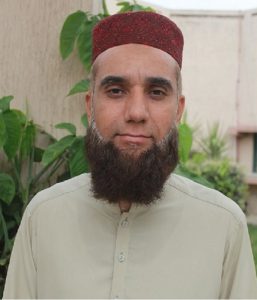Dr Muhammad Shafique
FACULTY

Dr. Muhammad Shafique has completed M.Sc in Zoology from Bahauddin Zakariya (BZU) University Multan, whereas M.Phil and PhD (Molecular Biology/Forensic DNA typing) from Centre of Excellence in Molecular Biology (CEMB), University of the Punjab Lahore. Dr. Shafique trained greatly as a forensic DNA scientist on STR analysis from Strand Analytical laboratories, Indianapolis, Indiana USA in 2006. He served as a forensic DNA scientist and deputy DNA technical manager (2004-2014) at Forensic Services lab, CAMB (Centre for Applied Molecular Biology, Ministry of Science and Technology) Lahore where he solved and reviewed proficiently thousands of criminal cases and appeared in court testimonies as forensic DNA expert. He is performing services as a group Incharge/supervisor in forensic lab of the Centre (CEMB). From 2022-2023, Dr. Shafique worked as an honorary post doctorate fellow and staff member at Centre for Forensic Science, University of Technology Sydney, Australia.
Dr. Shafique published many research articles in highly peer-reviewed international journals on forensic sciences. He has also filed patents for the development of STR multiplex PCR systems. Dr. Shafique participated in the 17th International Symposium on Human Identification 2006 at Tennessee USA, where he also attended a workshop on Forensic Statistics and ’06 Technology Tour
sponsored by Promega corporation, Chicago, Illinois USA. He worked as member National Forensic Science Commission Pakistan, member faculty board University of the Punjab Lahore and contributed rare STR allelic data to worldwide searchable databases like NIST (National Institute of Standards and Technology USA) STR database, STRidER database and Y-STR data to YHRD (Y-STR Haplotype Reference Database). Moreover, he granted NRPU HEC project for the development of 21 STR loci database for each province of Pakistan.
Dr. Shafique awarded HEC indigenous PhD scholarship in his PhD at CEMB. For the first time he developed a multiplex system for simultaneous detection of autosomal STRs and Y-STRs in the field of forensic DNA typing. Because of this achievement, he won the ‘Technology Award’ at 5 th Invention to Innovation Summit 2016 University the Punjab Lahore. He was invited as guest speaker in National Forensic Science conference organized by National Forensic Science Agency Islamabad, Pakistan. Dr. Shafique received performance evaluation awards many times from the University of the Punjab, Lahore. To train the police officials, medicolegal doctors, judicial staff and students, Dr Shafique organized/co-organized up to 10 workshops regarding crime scene search and modern forensic techniques for crime investigation. He also co-organized international symposia for advances in molecular biology of plants and health sciences at the Centre.
In developing Forensic DNA Typing with respect to applied and research areas in the country, he is fully confident to add value, by sharing his expertise.
Research Interests:
Forensic DNA typing, Population genetics, STR multiplex development, forensic DNA phenotyping, new emerging technologies for human identification. Next Generation Sequencing (NGS) of RM- STRs.
Selected Publications:
- Shafique, M., Sajid, N., Aziz, Y., Afzal, M., Shahzad, M., Shehzadi, A., Bashir, S., Daud, S. and Shahid, A.A. (2022). Genetic data of 22 autosomal STR loci in Khyber-Pakhtunkhwa, Balochistan and Gilgit Baltistan population of Pakistan using PowerPlex® fusion system. Legal Medicine, 59 p.102129. (IF= 2.017)
- Javed, F., Shafique, M., McNevin, D., Javed, M. U., Shehzadi, A., & Shahid, A. A. (2022). Empirical Evidence on Enhanced Mutation Rates of 19 RM-YSTRs for Differentiating Paternal Lineages. Genes, 13(6), 946. (IF= 4.141)
- Javed, F., Shafique, M., Rani, N., Rubab, A., Shahid, A.A. (2021). Allele frequency data of 15 autosomal STRs in Arain population of Pakistan. Int J Legal Med. (IF= 2.791)
- Rubab, A., Shafique, M., Javed, F., Saleem, S., Zahra, F.T., McNevin., D. and Shahid, A.A. (2020). Population genetic portrait of Pakistani LahoreChristians based on 32 STR loci. Nature-Scientific Reports.10:18960. (IF= 4.379)
- Zahra, F.T., Hussain, M., Khan, K. Aslam, M.A., Shafique, M., Rubab, A., Javeed, S. (2020). Genetic polymorphism of Y-chromosomal STRs in Gujjar population of Punjab. Int J Legal Med. 134, 1333–1334. (IF= 2.222)
- Saleem, S., Shahid, A. A., Shafique, M., Rubab, A., Javed, F., & Husnain, T. (2019). Phylogenetic analysis and haplotype diversity in Christian residents of Lahore, Pakistan, using 17 Y-chromosomal STR loci. International Journal of Legal Medicine, 134, 521–522. (IF= 2. 222)
- Shahzad, M., Hussain,M., Shafique, M., Perveen, R., Sheikh, N. (2019). Population genetic data of 30 insertion–deletion markers in Punjabi population of Pakistan. International Journal of Legal Medicine, 134, 511–512. (IF= 2. 222)
- Shafique, M., Shahzad, M. S., Rahman, Z., Shan, M. A., Perveen, R., Shahzad, M., Hussain, M., Shahid, A.A., & Husnain, T. (2016). Development of new PCR multiplex system by the simultaneous detection of 10 miniSTRs, SE33, Penta E, Penta D, and four Y-STRs. International Journal of Legal Medicine, 130(6), 1409-1419. (IF=2.382)
- Shafique, M., Hussain, M., Shan, M. A., Shahzad, M., Hussain, S., Hussain, N., Ehsan, F., Perveen, R., Iqbal, M. (2015). Genetic Diversity of 15 autosomal STR loci in the population of Southern Punjab Pakistan. Forensic Science International: Genetics, 19, e1-e2. (IF= 4.988)
- Perveen, R., Rahman, Z., Shahzad, M. S., Israr, M., Shafique, M., Shan, M. A., Zar, M.S., Iqbal, M., & Husnain, T. (2014). Y-STR haplotype diversity in Punjabi population of Pakistan. Forensic Science International: Genetics, 9, e20-e21. (IF=4.604)
